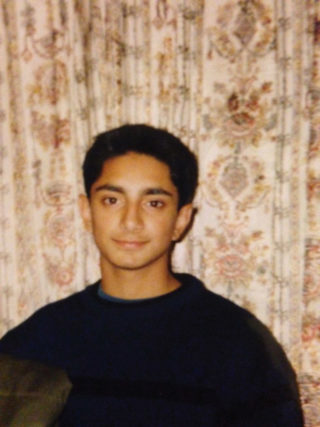Riz Ahmed (Riz MC) remembers what it was to be British Asian in hopeful 1998
And wearing a few bits of knock-off designer gear

And wearing a few bits of knock-off designer gear
It was 1998, right at the height of that Brit-Asian cultural explosion. You had Prince Naseem Hamed who was up there killing it, swaggering into the ring, proud. He was everyone’s role model. You had Goodness Gracious Me on TV. You had Bally Sagoo – he had a big hit. That seminal Bollywood flashback album came out. This was not long before Bend It Like Beckham. This was when British Asians started becoming a real cultural force in the mainstream while also being able to hold onto and own their identities without deracinating. You know, like, Selfridges started selling the handbags with Ganesh and Krishna on the side of them.
It was an interesting moment. We were all about exploring that, and reveling in that. Paki-pride and all that stuff. But in a slightly bizarre way because I’d hardly been to Pakistan, and when I had been there when I was 15 I was like, ‘this place… I can’t really relate to it very well’. That’s when I realised that when we were walking up and down Southall Broadway waving these flags, renting limousines and Ferraris, actually what we were shouting out was ‘us here’. Us hybrid Asians, you know. It was that.
For me it was also a confusing time to an extent. I was living in north west London with my family, but I got a scholarship to go to a private school. There was an Asian scene there – there were middle class white kids, Jewish kids and they had their own scene. I didn’t seamlessly fit into any of them. I could easily navigate all of them. I could adapt. I had friends in each of them, but there would always be a certain moment where I couldn’t cross that line where it was like all the more well off Asian kids are hanging out in this sports and health club in north west London that all their parents have membership of. I couldn’t go there. Or some of the white kids were going skiing. That wasn’t open to me. I was hanging out with my friends closer to where I grew up in Neasden and Willesden, but I’d miss out on key things. It was an exciting time but also when I really realised, like, ‘no one place is fully you’. Pakistan isn’t. None of these social circles in London are. What are you going to do? That’s when I started to really try and forge my own individual space. Writing lyrics was a massive part of that. Quite literally trying to find my own voice. I was thinking, ‘Yeah I love MCing’. But the idea that I could do that for a living, that never occurred to me at all. Same with acting. Acting, that was something that came out of a teacher taking me under their wing. I was getting into trouble in class, I was hyperactive and disruptive.
Back then music was a big deal. Growing up we had a Michael Jackson poster on me and my brother’s shared bedroom wall, but Tupac was the one. He was this kind of ‘fuck you, you don’t want us, but we’re here anyway’. That spoke to a lot of Asian kids. We were just starting to find our own ways of articulating that in our own cultural grammar. When Tupac dropped something like ‘Hit ‘Em Up’ that felt like it really caught the mood of the times. There was a lot of factionalism.
It was also about the clothes. That was a big part of it. It was waiting for the sales and going down to Proibito on New Bond Street and trying to swap all the prices on the clothes. Making sure you had the right Iceberg History or whatever. I was operating on the slightly cheaper level of your Sonneti’s and your Firetrap’s and then I’d reinforce that with the really good stuff where I’d get some fake bits. D&G shoes, the Versace’s, the off-cream print Moschino. It was decorating yourself, I didn’t have a load of stuff. What we had was basically our clothes. Green and white Reebok Classics. Green and white Adidas fibre tracksuits. Green and white for the colours of the Pakistan flag. It was this kind of thing.
I look back on it as a magical time, not just for me but in terms of where Britain was at; in terms of where my community was at; in terms of where UK garage and urban culture was at; where Asian culture was at. It was a hopeful time. Tony Blair was in and it was all Cool Britannia. Oasis were taking over the world. I look at that as a golden period before 9/11. And this century has just been brutal in many ways for many people. I really look back at it as a time of innocence and a time of possibility.
As told to: Greg Cochrane
Read previous Sweet 16 columns with the likes of Johnny Marr, Shirley Manson, Matt Helders and many more. Or listen to our Sweet 16 live podcast series.